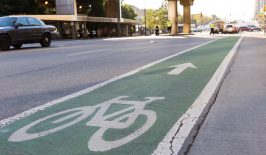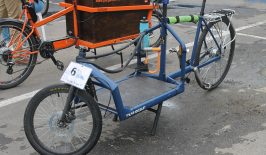Bike theft is cruelly familiar for many people. Countless cyclists have been victims of that all-too familiar unfortunate surprise: no bike, a broken lock, and few witnesses. BikeFair is a digital platform that aims to stop stolen bike sellers in their tracks.
Bicycle theft is one of the most common crimes in parts of the world where cycling is popular. The limited methods to securely lock a bike, the value of secondhand bikes, and the ease of selling them on – without recrimination – are all contributing factors. Adding to the problem is the fact that police can only do so much, and reporting the crime in the first place isn’t always seen as worthwhile. The stolen bike rackets also make the eco-friendly option of buying a secondhand bicycle a complex proposition, and often much sketchier than it might first seem, with no way for you to tell if the bicycle you’re buying was obtained by less-than-honest means. With limited paperwork required, unlike when buying a used car, it can be hard to know who to trust. And if you do happen to inadvertently end up buying a stolen bike, the results can be anything from forfeiting the bike to the police, to fines, to even more serious prosecution.
BikeFair is an online platform for buying and selling secondhand and used bikes that’s what specifically designed to tackle these problems – by offering a digital marketplace that is fairer, more secure, and friendlier for buyers and sellers. Launched in the Netherlands in mid-2019, the service now lists and sells dozens of bikes per week, and is open to everything from nifty e-bikes to cheap and cheerful commuters.
The BikeFair promise: a secondhand bike that’s definitely not stolen
BikeFair has a unique promise, guaranteeing that all bikes listed on the marketplace are legal and legitimate. While that sounds ambitious, BikeFair makes it happen by checking bicycle frame numbers, which are supplied through photos, against frame registrations and police records to ensure it hasn’t been reported as stolen.
If a bike frame number can’t be provided, which is sometimes the case even for legitimate bikes, BikeFair asks for a verified ID. BikeFair also ties with several of the world’s most widely used bike registries, that aim to better secure the world’s bikes. Bikes sold through BikeFair are registered in the Bike Index database if they aren’t in there already, and each bike is provided with a special non-removable security sticker which also acts as a theft deterrent.
CEO of BikeFair, Jan Pecnik, told RESET how well bike frame numbers work and shared some experiences with dealing with stolen bikes:
“We require every seller to provide the frame number and do this check automatically for them,” explained Pecnik. “We make it clear we do these checks, which is kind of a filter on its own. As a thief you probably won’t try and sell the bike you just nicked on a platform that checks whether the bike isn’t stolen. Yet we still encounter attempts! We always approach those individually – call the seller, explain the situation and provide specific suggestions on what to do with their bike.”
Stress-free payments and a hassle-free handover
The next key step in the process is payments. BikeFair helps keep sales fair by processing payments through its platform, doing away with cash and in-person pressures. This is different to normal classifieds but is targeted to ease the unique stress of buying a used bike.
The process is secured by having the buyer pay upfront to reserve the bike through BikeFair first. Naturally, the buyer can inspect, test, and buy the bike at any point, or cancel the transaction, without monetary risk to either party.
When the buyer agrees to the deal, money is released from BikeFair’s escrow service and goes directly to the seller. If the bike doesn’t suit the buyer, the reservation is cancelled, and the full reservation amount is returned to the buyer.
Removing the option to pay with cash is designed to put a stop to last-minute, uncomfortable negotiations with sellers. Pecnik explained that this was designed to be more secure, and related an experience of his own while buying a used bike in the Netherlands.
“Even in the ‘country of bikes’ it is surprisingly hard to find a good second-hand bike online. Days into my own search in Rotterdam, I finally found a bike that was still available and looked like a good deal. I had to travel across town to a district I was told to keep away from to go get it.
“To my surprise, a shady character turned up 30 minutes later, and brought a different bike than we discussed online – and even had the audacity to ask for more money because ‘he can easily sell it today to someone else’. To save further trouble, I took the deal, only to later learn that there’s a huge issue with bike theft in the Netherlands and that I probably ended up with a stolen bike. Of course, my bike got stolen two years later!”
Bringing BikeFair to the rest of the world
BikeFair launched its platform in the Netherlands, the world’s most bike-dense country. With the system now functional for anyone, the plan is to next launch throughout other countries in Europe, the UK, and US, through 2020.
BikeFair will shoon be fundraising through angel investment platform LeapFunder, and is open to venture capital as well.
Pecnik said funding would “help more people to find their new bike and give more bikes their second chance,” in a boost for both the circular economy and sustainable cities.
“Bikes are the vehicle of the future,” explained Pecnik, “and we want to make sure they are accessible to everyone in a sustainable and legal way, with the best marketplace to make it happen.”









